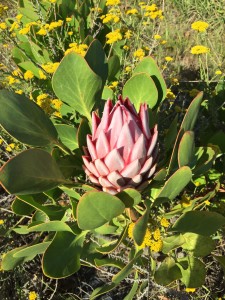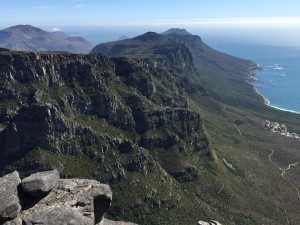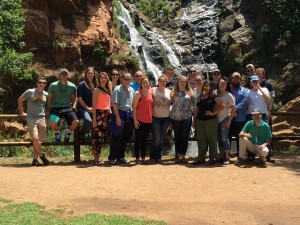Study Abroad
South Africa – 2015 by William R. Graves
Most Iowa State students enjoy a week away from classes with family and friends when Thanksgiving comes along each fall. Late November of 2015 was different for a group of 16 students who participated in a two-week study-abroad trip to South Africa. Instead of turkey and stuffing, these students were enjoying a braai (South African barbeque), rooibos tean, and south African wine. While Ames was doused with its first significant snow of the season, this group was lathering on the sunscreen and trying to keep hydrated. After all, late November is the warm season in the southern hemisphere.
Like all wise international traavelers, our group prepared and did its research before departure. Preparation included a semester-long class titled Horticulture and Ecosystems of South Africa led by professors Chris Currey and Bill Graves. Eleven weeks were spent discussing the natural vegetation, climate, soils, and agricultural practices of our destination, as well as the rich human history and culture of South Africa. Each of the 16 students, several from majors other than horticulture, researched a subject of particular interest and presented to class. Guest speakers enriched the curriculum on topics ranging from the geopolitics of South Africa to its struggle with HIV/AIDS.
After weeks preparing, our long journey began November 14, and the group arrived in Johannesburg safe, sound, and more than a bit weary on the 16th. We spent the first several days in that region of the country, where highlights included stops at nurseries, garden centers, and botanical gardens, and a meeting with public-health workers who are implementing ambitious programs to reduce the spread of HIV. No inaugural trip to South Africa would be complete without a safari. We were fortunate to witness a wide array of wildlife during an overnight stop at Pilanesberg National Park with tent-camp accommodations.
The latter portion of our trip was in Cape Town and surrounding areas at the southern extreme of the continent. We traveled by train for over 24 hours from Johannesburg to the cape, witnessing changing ladnscapes and various ecosystems along the way, and appreciating the train’s comfortable beds and good food and drink. The horticultural importance of southern South Africa was evident in its wealth of orchards, botanical gardens, and vineyards, several of which were in the wine-producing region around Stellenbosch. A student and faculty members from the University of Stellenbosch helped arrange visits to a game farm and local craft and produce markets. We explored a cave along the rocky Pacific coast, visited a flock of penguins, learned about unique plants of the fynbos, and enjoyed scenic views from atop Cape Town’s Table Mountain. The last day of our trip was spent visiting Robben Island, where Nelson Mandela and many other political prisoners were held during the apartheid era.
South Africa was uniquely suited for student learning. It provided a remarkable blend of horticulture, diverse ecosystems with unique indigenous flora, fascinating animal life, and a complex human history that at many points in our trip stimulated emotional discussions about racism, human rights, politics, and the environment, both in South Africa and our own country. Every participant came away from the trip with broadened perspectives and enhanced understandings of our world.
Proteas were a common site in the flora.
A view from atop Table Mountain Cape Town.
One of the numerous species of wildlife the group encountered.






